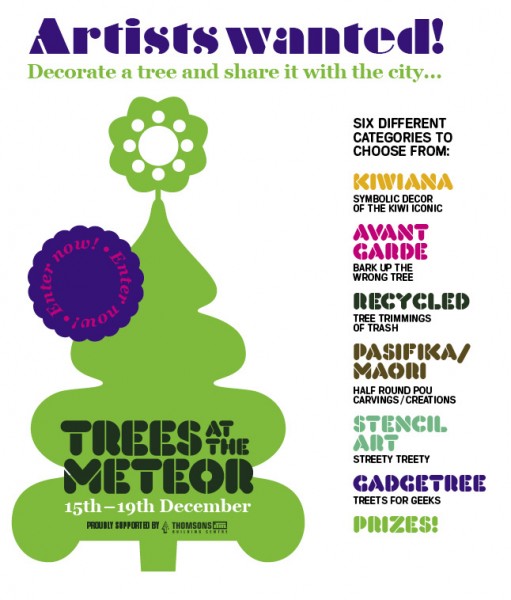Hamilton Artist Directory
Posted 14 years, 7 months ago 0 comments
Hamilton Artist Directory
Posted 14 years, 7 months ago 0 comments
For Immediate Release
Date: 19 August 2009
HAMILTON ARTIST DIRECTORY CREATES EXCITING OPPORTUNITIES FOR LOCAL ARTISTS.
Hamilton Community Arts Council is excited to announce a new initiative to provide Hamilton artists with a tasteful and affordable alternative to gallery space.
The Hamilton Artist Directory offers Hamilton artists a unique opportunity to gain exposure and recognition within the community, connecting them with potential clients.
Artists can list themselves in the directory for a nominal fee. The directory will then be distributed among galleries, art enthusiasts and businesses within the Waikato region.
This opportunity is ideal for artists who would like to showcase their work and advertise their talent.
There is so much quality artwork to be found around Hamilton if you know where to look, says Tracey Wood, HCAC Arts manager.
“There are so many talented artists in Hamilton, we want to provide them with another opportunity for their work to be seen and sold.” says Tracey Wood.
Few publications are created with the sole purpose of networking Hamilton artists. This directory will be a great investment for them and key to boosting the Hamilton art scene. Hamilton Community Arts Council strongly recommends artists to get on board.
The cost for listing will be $30 per artist. This is strictly to cover printing costs as this publication is non profit and solely for the benefit of the Hamilton art community.
Listing Requirements:
-
You must be within the Hamilton boundary
-
Your work must be classified as ‘fine art’
-
You must provide a Jpeg image of your work and 100 words about yourself as an artist
-
If you are selected to list, payment is required up front
If you are interested in listing, please contact Emma Mayer or Bridget Bisset.
Email: directory@hcac.org.nz
Phone: 07) 838 6424 ext.2 -Wednesdays and Fridays from 10am
Art is the new commerce
Posted 15 years ago 0 comments
For any artist feeling depressed about the recession, here's a reminder that you are in the very industry that can survive and thrive right now! Article posted on thebigidea website: http://www.thebigidea.co.nz/news/industry-news/2009/mar/54407-art-new-commerce
30 March 2009
With thousands now attending Auckland’s biennial contemporary Art Fair from both here and across the ditch, there’s never been a better time to be a contemporary artist, collector or art lover says arts patron, consultant, writer and retired lawyer, Warwick Brown.
In our recent history never have there been more artists, more dealer galleries or more auction houses. Art is the new commerce, collecting the new passion.
In his chunky new book, Seen this Century – out just ahead of May’s Auckland Art Fair – Warwick Brown has audaciously come up with an up-to-the-minute list of the 100 "ones to watch" to have emerged in our contemporary art scene throughout the country since the turn of this century.
Brown’s snap-shot gives the collector an invaluable tool by highlighting who is on the rise, who will become the next big thing and whose work should be bought now before prices skyrocket. It’s also a great reference for people wanting to find out what’s happening in the art scene around the country at the moment.
Brown’s a list maker from way back and proud of it. He’s done the hard yards casting his net and consulting widely to make sure he’s on the money in picking who he thinks are the most exciting and collectible artists currently out there, but he’s sure his list will also generate controversy. In fact, he’d be disappointed if it doesn’t rankle with people, seeing it as all part of a healthy art debate.
The talk around lists is inevitably, and understandably, about who doesn’t make the cut. Annoying people with his lists is familiar and fertile territory for Brown, who cites a friendly, long-standing stoush between him and his good friend Rodney Kirk Smith, the legendary art dealer, over another list of ‘121 New Zealand artists you should get to know’ Brown published in his Wellington newspaper art column 20 years ago.
He’s also expecting some flack for his deliberate decision to not cover performance and video/DVD art, film and other work of specialist interest.
Brown’s long had the collecting bug having set-up, with fellow art-lover Peter Webb, New Zealand’s first art co-op in 1975. The concept, where a group of enthusiasts buy artworks from a combined fund to build an art collection, has flourished since with a number of such groups operating now throughout the country. He’s the first to admit that, in the end, putting together a collection can be a bit of a gamble but says that, because emerging art is so affordable, if you get it wrong it’s not a huge blow – unlike blue-chip collecting where the stakes are much higher. There are sure to be some on his list who may not be around in ten years time but this is what makes art collecting such a stimulating and enriching journey. In the end, it’s such a rewarding experience you can never lose.
And, Brown’s tips for fledgling collectors? He says people need to do their research, get out there and keep looking at art but in the end you have to go with your gut instinct. He firmly believes a good idea always sticks.
Random House publishing director, Nicola Legat, says it’s such a thrill to publish a book which takes reasonably tough art to such a wide audience, but as a former newspaper art critic Warwick Brown was the one to do it.
"Like any profession, people in the industry tend to use jargon a bit much, which can be intimidating for some people. Warwick skilfully discusses each artist and their work in such a warm and accessible way, the book’s a real page-turner – but no one could accuse him of dumbing the work down.
"His writing style is so conversational, engaging and inclusive it really makes you immediately want to race out to the dealer galleries the very next Saturday to see what they’ve got up on the walls."
Further information:
Warwick Brown has travelled widely in Europe, America and Australia looking at classic Modernism and contemporary art. He has been a contributor to Art New Zealand magazine and numerous catalogues and was art columnist for the Dominion Sunday Times from 1983 to 1993. His first two books, 100 New Zealand Paintings (1995) and Another 100 New Zealand Artists (1996), were highly successful, and were followed by the monograph Ian Scott in 1998. After retiring as a lawyer in 1990, Brown directed dealer galleries in Auckland for 10 years and then became a practising artist himself.
Reference:
http://www.thebigidea.co.nz/news/industry-news/2009/mar/54407-art-new-commerce
DINZ - News Release from the office of Associate Commerce Minister Judith Tizard
Posted 15 years, 6 months ago 0 comments
September 24, 2008
The Designers Institute of New Zealand is very pleased to announce the introduction of legislation to repeal the commissioning rule. The law change is necessary to recognise the reality of day-to-day design practice, and to provide New Zealand designers with a basic level of copyright protection already enjoyed by our overseas counterparts.
DINZ, as with other organisations we are aligned with, appreciate how important this law change is for the creative industries, and we are pleased that Parliament has recognised the validity of the submissions made by DINZ on behalf of designers and the wider creative industry in New Zealand.
News Release from the office of Associate Commerce Minister Judith Tizard - Commissioning rule to be repealed and parody/satire review announced
Associate Commerce Minister, Judith Tizard has introduced to the House an amendment to the Copyright Act that would repeal the commissioning rule. She also announced that a review on whether there should be a copyright exception for the purpose of parody and satire has begun.
The general rule is that the creator of a work holds the copyright to it. However, the commissioning rule, which affects artistic workers such as photographers, has been an exception to this, meaning that the commissioner of a work is the default copyright holder.
"This is an important step in the promotion of creators' rights to copyright ownership and will assist New Zealand photographers in particular to be more competitive, it also brings us in line with many other common law counties," said Judith Tizard.
The United Kingdom repealed their commissioning rule in 1988, in Australia commercial photographers have default copyright over their works, and Ireland and Canada have either amended or repealed their commissioning provisions or are in the process of doing so.
Currently, the commissioning rule allocates copyright ownership by default to the commissioner for artistic works, sound recordings and for the taking of a photograph or the making of a film. The rule does not apply to dramatic works or literary works (except computer programmes).
The recommendation to repeal comes after two rounds of consultation in both 2006 and 2007.
"Repealing the rule is intended to simplify the law by ensuring consistent application of default copyright ownership across all categories of commissioned works. It could also assist creators to retain copyright in their original works, which would in turn expand their ability to create future works," said Judith Tizard.
A repeal of the commissioning rule will provide greater consistency across all commissioned works using the example of an author who is commissioned to write and illustrate a book.
"Currently in this situation, the default rule states that the commissioner automatically owns copyright in the illustrations as they are an ‘artistic work', whereas the author as the creator automatically owns copyright in the literary aspect of the work," she said.
"With a repeal, the new default rule will allocate copyright ownership to the author in both the artistic and literary aspects of the work."
There will be no alteration to section 105 of the Copyright Act which provides privacy protection for private commissioners of photographs or films. It includes a requirement that the commissioner's permission be sought to use the work where copyright in that work is owned by someone other than the commissioner.
For the majority of private commissions, creators use standard form contracts to assert copyright ownership; therefore section 105 provides an important privacy protection mechanism and will continue to do so after the commissioning rule is repealed.
Judith Tizard pointed out the contracting out clause will be retained. "What will not change with a repeal is the ability for either the creator or the commissioner to negotiate out of the default rule."
The Minister also used this opportunity to announce the commencement of a review on whether there should be a copyright exception for the purpose of parody and satire.
"The impetus for the review is to ensure the Copyright Act continues to provide clarity to copyright users, rights-holders and internet service providers as to what constitutes infringing material," she said.
"The Copyright Act is currently silent on the issue of parody and satire. With the recent introduction of the Copyright (New Technologies) Amendment Act, there is further need to ensure our legislation remains unambiguous when assessing what amounts to copyright infringement."
Key considerations in the review will be whether a parody and satire exception is necessary in New Zealand, and whether providing such an exception would disrupt the balance between the competing interests of copyright creators, owners and users.
A discussion document on the issue of parody and satire is planned for public release in December 2008.
Media contact: Jake Quinn, Office of Judith Tizard, 04 471 9871, 021 227 9871
DINZ wishes to acknowledge our Gold Sponsors Clendons for assisting the Designers Institute in presenting submissions on the commissioning rule.

